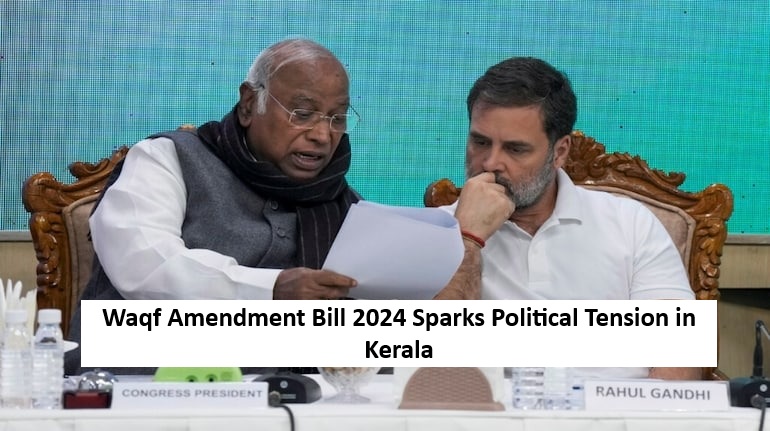
The recent passage of the Waqf (Amendment) Bill 2024 in the Lok Sabha and Rajya Sabha has created political upheaval in Kerala, challenging traditional party loyalties and reshaping community dynamics. While Congress aimed to oppose the bill to retain national Muslim support, the situation is more complicated in Kerala, where the legislation touches on deep-rooted land disputes involving multiple communities.
Munambam Land Dispute Fuels Local Tensions
At the heart of Kerala’s backlash is the Munambam land conflict, where the Kerala State Waqf Board claims 400 acres currently occupied by over 600 Christian and Hindu fishing families. These residents possess valid land titles and pay taxes but remain entangled in legal uncertainty due to the Waqf Act of 1995, which directs such disputes to Waqf Tribunals—bodies many view as biased.
BJP Gains Ground with Christian Communities
The Bharatiya Janata Party (BJP) has seized the moment to build ties with Kerala’s Christian communities, especially through outreach to the Kerala Catholic Bishops’ Council (KCBC). The KCBC, which includes major Catholic denominations, has condemned the existing Waqf laws as "unconstitutional and unjust."
BJP State President Rajeev Chandrasekhar has held strategic meetings with community leaders like Cardinal Baselios Cleemis and SNDP’s Vellappally Natesan, praising the KCBC's stand and defending the Bill as necessary for justice, not religious bias.
Catholic Media and Public Support Intensify Pressure
The Catholic newspaper 'Deepika' published a scathing editorial criticizing Congress and CPI(M) for ignoring KCBC’s plea. The April 1 editorial warned lawmakers that “future generations will hold you accountable”, accusing them of taking Christian support for granted.
It highlighted Munambam's struggle as symbolic of broader injustice and urged the BJP to ensure the amendment includes the return of wrongfully claimed land.
Shift in Munambam: BJP Gains Rare Ground
In Munambam, normally not a BJP stronghold, the passage of the Bill was met with celebrations. Slogans like “Bharat Mata Ki Jai” and “Jai Modi Ji” echoed through the streets. Local leader Siji Ayil noted that Minister Suresh Gopi presented the community with a Koratti Muthi statue, reinforcing emotional and religious solidarity. Gopi is also expected to visit the Koratti Muthi Church soon.
Christian Political Factions in a Bind
Christian-based parties like Kerala Congress (Joseph) are trying to balance community concerns and political strategy. MP Francis George acknowledged the Bill’s potential benefits but argued for state-level authority in such disputes.
John Joseph, son of KC(J) chairman PJ Joseph, dismissed BJP’s outreach as vote-splitting tactics aimed at minorities. He warned that it could indirectly benefit the Left Democratic Front (LDF) while undermining Muslim-Christian harmony.
Mixed Muslim Reactions to the Amendment
Muslim reactions in Kerala are divided. While groups like Jamiat Ulema-e-Hind and Jamat E Islami oppose the amendment, citing threats to religious authority, not all Muslims support Congress’s stance. Many Muslims are also frustrated with Waqf Boards, as over 50% of Kerala’s 1,008 Waqf-related cases involve Muslim plaintiffs, pointing to broader dissatisfaction.
Congress Faces Dilemma Amid Shifting Alliances
The Waqf Amendment Bill has left Congress in a political trap—struggling to maintain national Muslim support while facing discontent from Kerala’s Christian and Hindu communities. As the BJP steps in to fill this void, traditional political lines in the state are beginning to blur.
Read More: The Halwa Mystery Why Akhilesh Yadav is Questioning the New US-India Trade Deal

 Share
Share

_1060084071_100x75.jpg)

